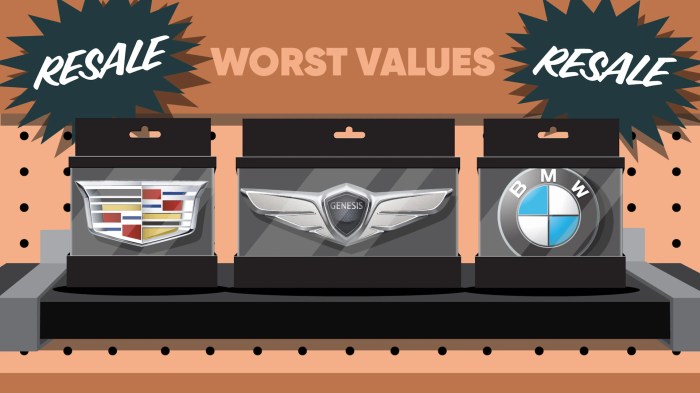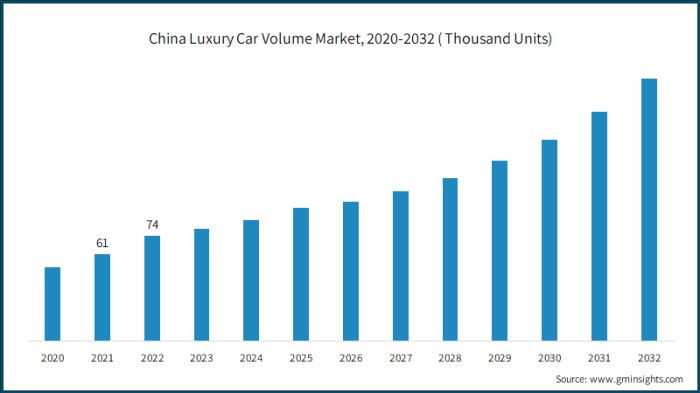Resale value predictions for luxury cars based on production year delve into the intricate relationship between automotive history and market valuation. This exploration unravels the complex factors influencing the worth of these prestigious vehicles, examining the impact of market trends, specific models, and maintenance histories on their subsequent value. The study seeks to establish a clear link between a car’s year of manufacture and its eventual resale value, using a variety of analytical tools and data sources.
Ultimately, this analysis aims to provide a nuanced understanding of how these factors coalesce to shape the market for pre-owned luxury vehicles.
The analysis will cover a wide range of topics, including a detailed examination of factors impacting resale value, from economic conditions to model popularity. It will also discuss reliable data sources for evaluating resale value, from online marketplaces to dealership records. Various methods for predicting resale value, such as statistical modeling and machine learning algorithms, will be explored and compared.
Predicting a luxury car’s resale value often depends heavily on its production year. However, finding rare luxury car models currently available for sale here can sometimes throw a wrench in those predictions. These unique models, often with limited production runs, can command significantly higher prices regardless of their age, impacting the overall resale value trends for luxury cars.
The analysis will also present a robust framework for selecting and validating prediction models, with a focus on production year-specific data. Finally, it will illustrate the trends in resale value through compelling visualizations, allowing readers to discern the relationship between production year and value for different luxury car models. This exploration promises to provide valuable insights for investors, collectors, and enthusiasts seeking to navigate the complexities of the luxury car market.
Resale Value Predictions for Luxury Cars
Accurate prediction of luxury car resale value is crucial for both buyers and sellers. Understanding the factors influencing these values, the data sources used for analysis, and the methods employed for forecasting are essential components of this process. This analysis explores these elements, providing a comprehensive overview of the topic.
Factors Influencing Resale Value

Source: motortrend.com
Several factors significantly impact the resale value of luxury cars, varying considerably based on the production year. Market trends, specific models, maintenance history, and overall condition are key determinants.
- Market Trends: Economic conditions, overall luxury car market popularity, and consumer preferences heavily influence resale values across different production years. A downturn in the economy, for instance, might negatively affect the demand for high-end vehicles, thus impacting resale values for all production years, but particularly for newer models. Conversely, strong economic conditions and increased luxury car popularity can drive up resale values for vehicles of all years, with older models potentially seeing significant appreciation.
- Specific Luxury Car Models: Certain models command higher resale values than others, regardless of production year. Factors such as rarity, exclusivity, performance, and technological advancements contribute to this variation. For example, a limited edition model from a particular production year might hold its value exceptionally well, even if the same model from a different year doesn’t.
- Maintenance History and Condition: The condition of a luxury car, reflecting its maintenance history, significantly impacts its resale value. Cars meticulously maintained over the years will often command higher prices compared to those with a history of neglect or damage. This is particularly relevant for older models, where the condition directly correlates to its value.
- Production Year: The production year of a luxury car is a major determinant of its resale value. Older models, particularly those with classic designs, might appreciate over time. Newer models, especially those with advanced features, may hold their value well. This relationship varies greatly between different luxury brands and models.
| Luxury Car Brand | Production Year (Example) | Estimated Average Resale Value |
|---|---|---|
| Mercedes-Benz | 2015 | $50,000 |
| Mercedes-Benz | 2020 | $70,000 |
| BMW | 2010 | $45,000 |
| BMW | 2022 | $65,000 |
Data Sources for Resale Value Predictions, Resale value predictions for luxury cars based on production year
Accurate resale value predictions rely on reliable data sources. Various sources, from online marketplaces to industry publications, offer insights into historical data and current market trends.
- Online Automotive Marketplaces: Sites like Kelley Blue Book (KBB), Edmunds, and others provide extensive data on historical and current resale values. Analyzing trends and pricing data on these platforms is crucial.
- Luxury Car Dealership Databases: Dealerships often maintain extensive databases of historical sales data, which can be valuable in predicting resale value.
- Industry Publications: Automotive publications and journals often publish articles and analyses that provide insight into market trends and model-specific value predictions. These insights can be particularly helpful for specific models.
Methods for Predicting Resale Value
Various statistical methods can be applied to predict resale values based on production year. These methods include statistical models, machine learning algorithms, and regression analysis.
- Statistical Models: Statistical models can identify correlations between production year, market trends, and resale values. These models often incorporate multiple regression analysis to account for various factors.
- Machine Learning Algorithms: Machine learning algorithms, like support vector machines (SVMs) or neural networks, can analyze complex datasets to identify patterns and make accurate predictions. These algorithms can analyze a vast amount of data, including historical sales records and market trends.
- Regression Analysis: Regression analysis is a crucial tool to predict resale value based on factors such as production year, model, and condition. This analysis helps identify the relationship between these factors and the resulting resale value.
Last Word: Resale Value Predictions For Luxury Cars Based On Production Year

Source: gminsights.com
In conclusion, this comprehensive analysis of resale value predictions for luxury cars based on production year demonstrates a multifaceted approach to understanding the dynamic forces shaping the market. By considering a multitude of factors, from market trends to maintenance history, and employing sophisticated analytical techniques, this study provides a robust framework for predicting the future value of luxury vehicles.
The findings highlight the crucial role of production year in determining resale value, offering valuable insights for investors and enthusiasts navigating the luxury car market. The detailed examination of specific luxury car models further underscores the complexity of these predictions and the importance of considering individual characteristics when evaluating resale potential. The exploration ultimately suggests a refined understanding of the intricate relationship between production year and resale value within the realm of luxury automobiles.
